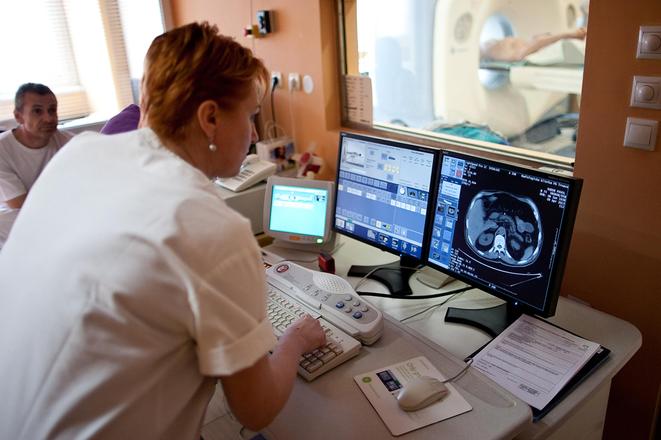RELATIONS between medical personnel and pharmaceutical companies are a sensitive matter and to increase transparency the Health Ministry is proposing changes.
“Sometimes trust in doctors is missing and patients perceive the contact between the pharmaceutical industry and doctors very sensitively,” said Health Minister Viliam Čislák, as quoted by the TASR newswire. “Nevertheless, cooperation by doctors with [pharmaceutical] companies can be useful and beneficial for patients, especially in terms of education, clinical studies or access to international projects.”
The cabinet approved the draft revision to the Law on Medicines and Medical Devices in late August and after parliament votes on it the changes will be effective in 2016. It shifts the duty to report about expenditures for promotion, marketing and financial and non-financial gifts provided by pharmaceutical companies from doctors to the companies. According to the Health Ministry, the original rules from 2011 have not been properly applied and only a small number of doctors reported these activities.
Zuzana Dančíková from Transparency International Slovakia (TIS), which consulted on the changes, pointed out that just 23 medical staff reported income from pharmaceutical companies last year when she believes the real number is likely in the thousands.
“Medical personnel have a large influence over what medicines patients will take,” Dančíková told The Slovak Spectator. “When medical personnel simultaneously cooperate with pharmaceutical companies, they can face a conflict of interest.”
The revision requires the pharmaceutical companies to report gifts, lessening the burden on doctors. Reports on expenditures provided to medical staff directly or through a mediator will be submitted each half-year to the National Health Information Centre, which will publish the data on its website. The changes also stiffen penalties for violations.
“Appropriate sanctions could amount to €10,000,” Health Ministry spokesman Peter Bubla told The Slovak Spectator, “and repeated violations could be up to €30,000.”
Doctors oppose the change
Doctors see the revision as focusing on secondary problems rather than core issues.
“It focuses on solving secondary and partially fabricated problems instead of focusing the attention and efforts of those who initiated this revision on measures that would really improve quality and condition of providing health care to our patients,” the Slovak Medical Chamber and the Slovak Medical Association wrote in a joint stance.
According to the groups, relations between doctors or other medical staff and patients as well as those with pharmaceutical companies are a matter for ethical supervision.
The Association of Private Doctors (ASL) says the revision assumes that doctors have bad intentions.
“We do not have a problem with transparency; we have a problem with publishing incomes that may also serve dishonest purposes,” Ladislav Pásztor, president of ASL, told The Slovak Spectator, adding that no other sector of society, apart from politicians and public administration, has such a duty.
Pásztor elaborated that when a doctor receives income from a pharmaceutical company, for example, for work in education, publishing this amount may produce assumptions that the income came for some other reason.
The Health Policy Institute (HPI) think tank is of the opinion that the health-care sector has bigger issues to solve and that the revision brings only small changes to the legislation from 2011.
“The revision does not make doctors angry because they have something to hide,” Tomáš Szalay from HPI told The Slovak Spectator.
Szalay sees a much bigger chance for corruption in the process that determines which medicines are covered by health insurance.
Cooperation can benefit
According to Transparency International cooperation between pharmaceutical companies and medical staff is usually legitimate and beneficial for patients, however, reviews sometime reveal unfair activities that encourage the use of certain medicines.
“We know situations from abroad in which cooperation hides inappropriate agreements in order to increase prescribing of specific medicines,” Dančíková told The Slovak Spectator, adding that she believes the new public reporting requirements will help patients have a clearer picture of relationships between doctors and pharmaceutical companies.
According to Katarína Slezáková, executive director of the Association of Innovative Pharmaceutical Industry (AIFP) that represents pharmaceutical companies, transparent cooperation brings concrete results in the form of clinical trials, education and improved treatments.
“Patients need an educated doctor with an overview of new treatment trends,” she said.
According to Ondrej Sukeľ, president of the Slovak Chamber of Pharmacists (SLeK), the legal changes will not affect systematic medical education. It is the legal obligation of each doctor to personally continue his or her education.



 Concern about drug firms influencing doctors. (source: Sme)
Concern about drug firms influencing doctors. (source: Sme)